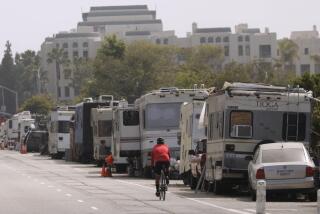Poway to Buy Mobile-Home Park to Aid Tenants
- Share via
It’s the same old story, but with a unique twist. Poway is planning to condemn a 25.5-acre mobile-home park and sell the spaces to the tenants.
Residents of the aging Poinsettia Mobile Home Park on Midland Road were driven to the wall with yearly space rent increases of up to 15% a year when they appealed to the city two years ago. Now, thanks to some deft maneuvering by city officials and an understanding City Council, the tenants are about to become the owners.
Eminent Domain Invoked
The Poway City Council took the giant step Tuesday night by approving eminent domain proceedings against the Orange County owners of the Poway park, an action taken through the city’s redevelopment agency.
State Housing and Community Development Department officials and representatives of the Golden State Mobilehome Owners League say that it is the first time that a city has used its redevelopment powers to acquire a park for its tenants.
Ozzie Thurgood, a Poinsettia resident, said the idea came from a federal Housing and Urban Development agency pamphlet outlining ways that cities could help preserve affordable housing.
“It gotten pretty bad here and in the other two parks in town,” Thurgood said. “The rents are up to more than $300 a month here. At least one family just abandoned their home and moved away.”
Other Poinsettia residents said that rent increases from 7% to 15% a year had driven other tenants to put their mobile homes up for sale and to move into apartments when they could no longer afford payments on their mobile homes and also to the park’s owners.
Thurgood blamed the economic squeeze on real estate agents who tell investors that, while an apartment building may offer only a 3% to 4% yearly return on investment, mobile home parks offer a 20% to 50% annual return.
Reba Touw, Poway director of planning, said most of the tenants in the 262-space park are on fixed retirement incomes or are young families faced with making payments on their homes and on their park spaces. Both groups came to the city in 1985, pleading for the city to enact mobile-home rent controls to protect them from the escalating rentals.
But Plan Is Not Cheap
Buying the park will be costly, she admits, because an appraisal of the property put its estimated value at $8 million to $8.4 million for the land. In addition, the city may have to put up $700,000 to $2.1 million to cover the costs of renovating the park, which was opened in the 1960s, and for creation of a nonprofit management agency to operate the park.
Representatives from the city and the park will go to Sacramento on Friday for a hearing on a request for a $740,000 state grant for the park acquisition project. Touw and Mayor Bruce Tarzy stressed that the city still has the opportunity to back out of the park acquisition if the state refuses to provide the grant.
Touw said that the park owners had no intent to sell the property when approached by the city and that “considering the point from which we started, negotiations have gone relatively smoothly.” However, the city plans to file suit against the owners to acquire the land under eminent domain.
Tarzy said details of the transaction have yet to be worked out but plans are to freeze rents to tenants’ present rates for several years and then increase the amounts by no more than 5% a year until they are at levels adequate to pay back, without government subsidy, the $8 million or more in low-interest city redevelopment bonds which will be needed to acquire the property.
Councilman Bob Emery, whose mother is a Poinsettia resident, was not present at the time of the City Council vote to initiate condemnation proceedings. Emery, who served as mayor at the time the Poinsettia Mobile Home Park tenants first approached the city for protection against stiff rent increases, has taken no part in the planning or votes on the project, Tarzy said, “in order to avoid any appearance of conflict of interest.”
‘Will Set a Pattern’
The Poinsettia park acquisition “will set the pattern” for similar action at Poway’s other parks, if park tenants desire to acquire their own spaces, Tarzy said.
Patricea Dean, legal counsel for the Golden State Homeowners League, declined to comment on the Poway proposal.
She pointed out that cities and other governmental bodies “are required under state and federal law” to provide adequate housing for residents of all income levels.
Some communities, she said, are using park acquisitions to avoid having to comply with a 1980 state law that mandates that manufactured housing be allowed in any residentially zoned area if it meets the same building code standards as conventional housing.
More to Read
Sign up for Essential California
The most important California stories and recommendations in your inbox every morning.
You may occasionally receive promotional content from the Los Angeles Times.






